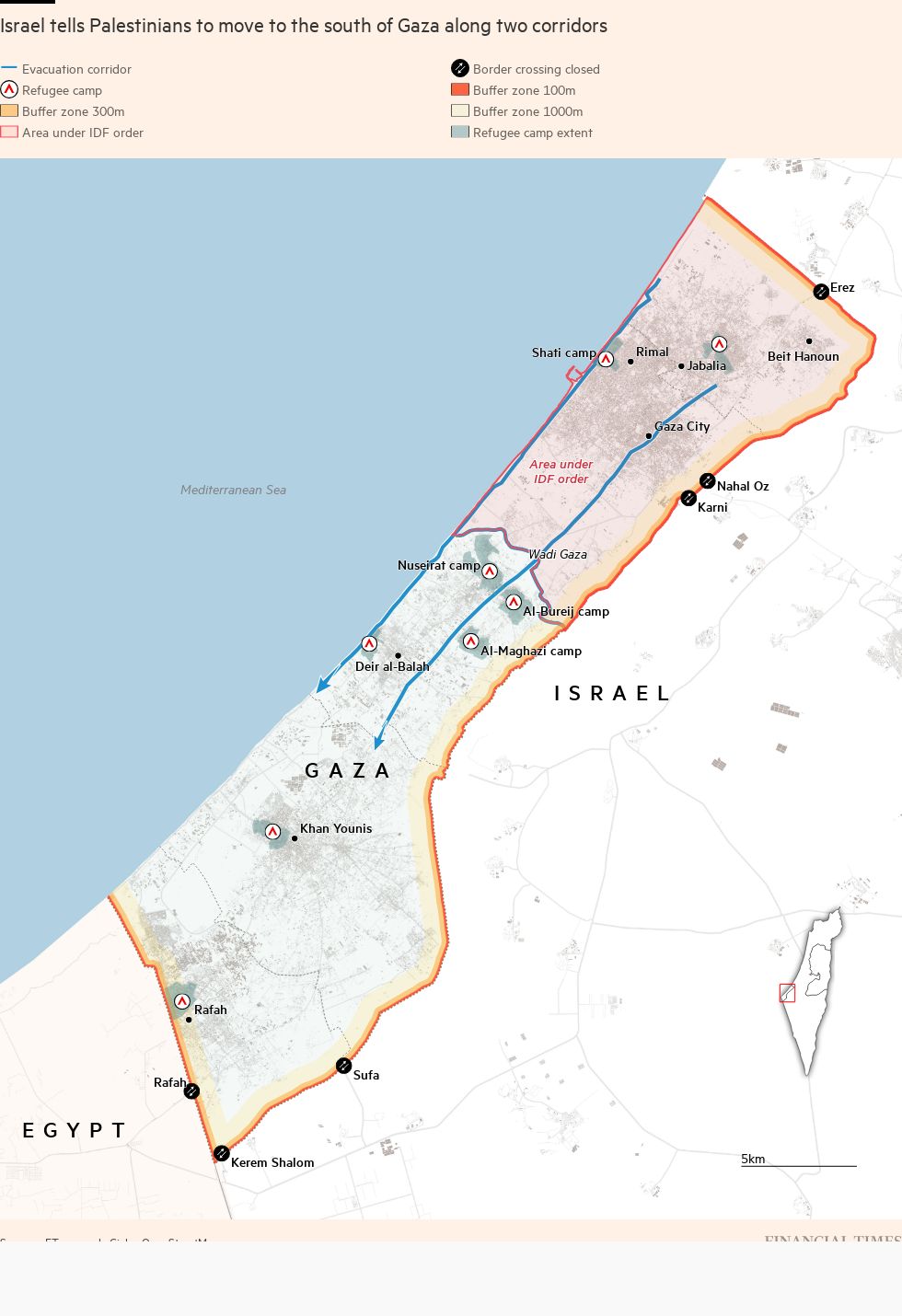Unlock the Editor’s Digest for free
Roula Khalaf, Editor of the FT, selects her favourite stories in this weekly newsletter.
International pressure has mounted on Israel and Egypt to relieve the humanitarian crisis in the Gaza Strip as US secretary of state Antony Blinken continues efforts to prevent the war with Hamas from spreading further.
The US and other countries have been pushing Israel to allow aid into Gaza and Egypt to open the Rafah crossing between its territory and the south of the enclave.
Ahead of returning to Israel on Monday after a tour that took in Egypt and the Gulf states, Blinken said the shared international priority was “to prevent the conflict from spreading, to safeguard innocent lives, and to get assistance to those in Gaza who need it”.
In a post on the social media network X, he added that Washington was “actively working to ensure the people of Gaza can get out of harm’s way and the assistance they need — food, water, medicine — can get in”.
The UN agency for Palestinian refugees also said on Monday it was pushing “at the highest levels” for humanitarian access via Rafah. The UN says 600,000 people in Gaza have already fled to the south of the territory, in line with Israeli instructions to leave the enclave’s main city, and are “in increasingly dire conditions”.
But, despite reports that Rafah could open at 9am local time on Monday, diplomats and security officials said no deal had been reached between Israel and Egypt, and the border had not opened as of 12.00 local time.
Israel and Hamas also denied reports that a temporary ceasefire had been agreed to allow aid into the strip. The office of Israel prime minister Benjamin Netanyahu said: “There is currently no ceasefire for humanitarian aid in Gaza in return for the exit of foreigners.”
Israel has subjected Gaza to an intense bombardment since Hamas militants launched a devastating assault on its territory on October 7. The Israeli military has said that attack killed more than 1,400 people and added on Monday that 199 — more than previously thought — had also been taken hostage.
Palestinian health officials said on Monday that Israel’s bombardment had killed 2,750 people, surpassing casualties recorded during the 50-day Israel-Gaza war of 2014.
Western nations, including the US, have been trying to secure safe passage for their citizens in Gaza through the Rafah crossing.
But Egypt has made it clear it is opposed to opening its borders to fleeing Palestinians — who could remain in the country — and wants aid to be sent to people inside Gaza instead.
Two ministers in Netanyahu’s government also vehemently rejected the idea of opening Rafah, with energy minister Israel Katz saying he “bitterly opposes” such a step.
“Our commitment is to the families of the murdered and kidnapped hostages — not to the Hamas murderers and those who helped them,” Katz said.

Israel has cut off supplies of electricity, water, fuel and goods to Gaza and ordered almost half of its 2.3mn people to leave the north of the strip ahead of an expected ground invasion.
The World Health Organization said on Sunday that four hospitals in the north were “no longer functioning as a result of damage and targeting”, adding that 21 hospitals in Gaza had received orders from Israeli forces to evacuate.
“Forced evacuation of hospitals may amount to a violation of international humanitarian law,” it said.
UNRWA, the UN agency for Palestinian refugees, has described the number of people seeking shelter in its facilities as “absolutely overwhelming” adding that it now lacks “the capacity to deal with them.”
The spiralling violence has sparked concerns that fighting between Israel and Hamas could spill over into a regional conflict.
Hizbollah, the Iran-backed militia in southern Lebanon, and Israeli forces have repeatedly exchanged fire across the border in recent days, while there has also been a surge of violence in the occupied West Bank.
Israel said on Monday it would begin to evacuate the residents of 28 towns within 2km of its border with Lebanon.
On Sunday, US president Joe Biden warned Iran against escalating the fighting between Hamas and Israel, while saying it would be a “big mistake” for Israel to reoccupy Gaza.
“Hamas and the extreme elements of Hamas don’t represent all the Palestinian people. And I think that . . . it would be a mistake . . . for Israel to occupy Gaza again,” Biden said in an interview with CBS, which was recorded on Thursday.
Israel’s ambassador to the UN, Gilad Erdan, said in response that Israel had “no interest to occupy Gaza or to stay in Gaza”, but insisted it had to “obliterate” Hamas.
“We would like to be co-ordinated with our American allies. But for now, the only focus should be how to release the hostages, how to secure our future by obliterating Hamas’s capabilities,” he told CNN.



Leave a Reply